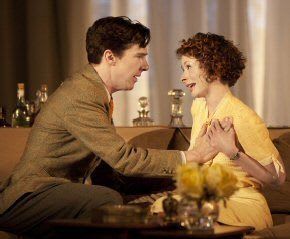After the Dance was first seen in June 1939 and its West End run was cut short by the War that hovers hazily in the background. Thereafter, despite Terence Rattigan's popularity, it faded from view, seemingly forever.
The three-act play is somewhat uneven but the bittersweet mix of social observation and wry comedy gradually becomes intoxicating in Thea Sharrock's well-judged revival.
Hildegard Bechtler has created a gigantic, very comfortable, drawing room with a veritable forest in the background. In this setting, we enjoy a three-hour evening that has much of Noël Coward to it - think of a mix between Present Laughter and The Vortex.
This is the home of a prickly, self-centred historian David Scott-Fowler, played by Benedict Cumberbatch, and his wife Joan, given due nobility by the ever-excellent Nancy Carroll.
It also houses a couple of Chekhovian supernumeraries: John Heffernan's young Peter, a poor relation who acts as David's secretary and lazy, slobbish John, marvellously brought to life by Adrian Scarborough. The latter may primarily be a figure of fun but he also turns out to have an unsuspected heart when things fall apart.
After a rather flat opening act to set the scene, the catalyst for a poignant middle section is Peter's pretty little fiancée Helen. Faye Castelow in this role makes a big impression as a single-minded girl who, though a tedious moralist by inclination, thinks nothing of making a play for David without a thought for the consequences, which are truly earth shattering.
The division of existing couples initially appears inconsequential, as there is always another party to attend. Anyway, David and Joan show great maturity and we are led to feel that a good shake-up might just persuade callow Peter to grow up.
In fact, following a wild evening featuring large numbers of gay (old sense), not quite so young, things, the world for these wealthy drunkards with cut glass accents is changed forever.
Clearly, while it is only a few people who are obliged to change their habits on stage, they are intended to represent a country that is about to go to war with its inevitably devastating consequences on millions more.
The acting is as strong as one has come to expect at the National with all of the leading players on top form. They are well supported, especially by Pandora Collin playing Julia Browne, the kind of dreadful party animal who long ago gave up any kind of thought or feeling in a permanent search for hedonism.
Terence Rattigan went out of fashion with the arrival of the Angry Young Men, but like Coward, he is coming back into vogue, and a new audience will get the chance to appreciate his skills in this enjoyably light but ultimately moving production.
